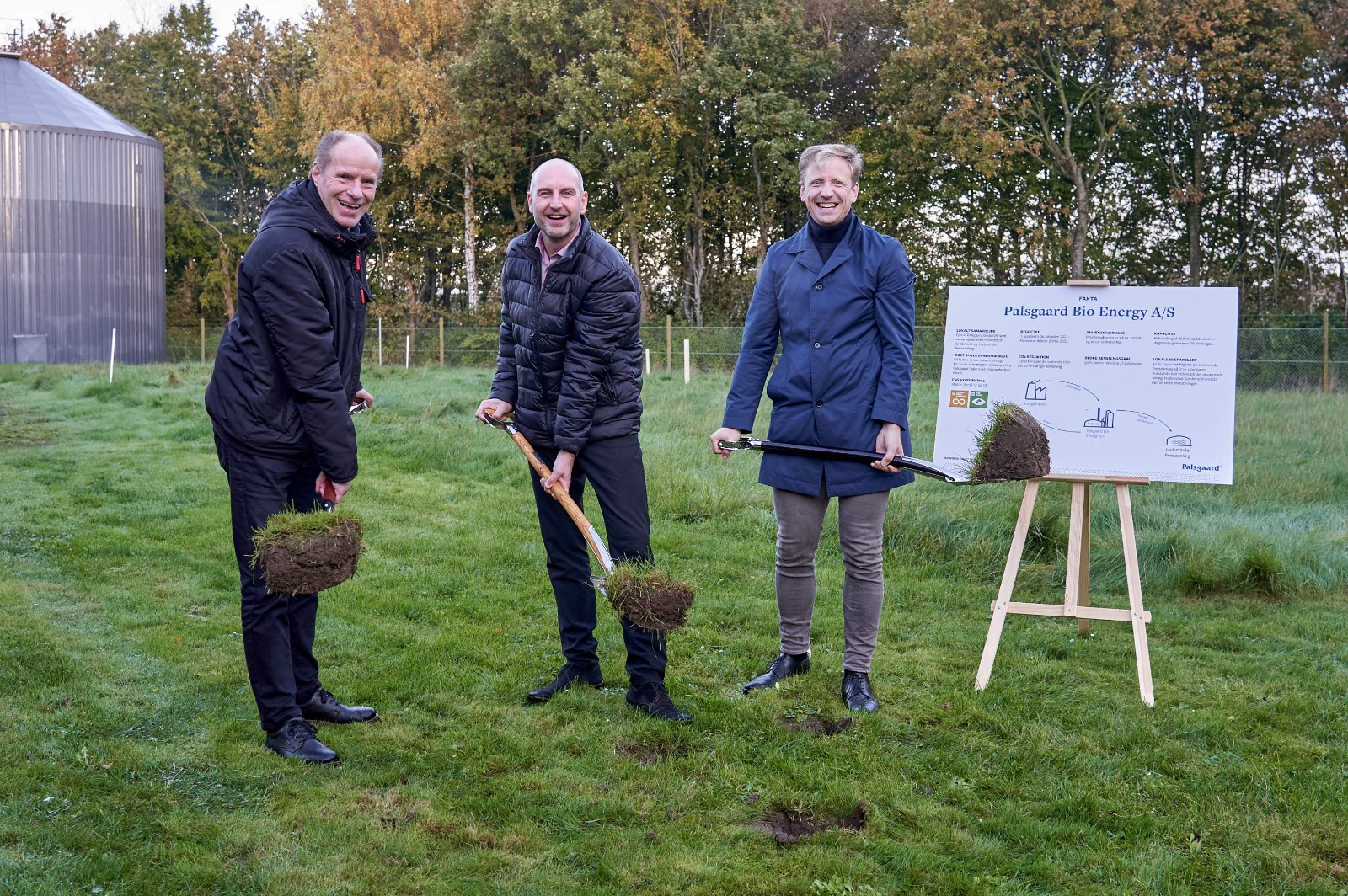The wastewater treatment facility Hedensted Spildevand and the ingredient company Palsgaard have joined forces to develop new technology, which enables a circular treatment of wastewater. This will maintain CO2-neutrality in Palsgaard’s Danish production as it increases towards 2030.
As a result of the close public-private partnership between food ingredient/plant-based polymer additives company Palsgaard in Juelsminde and Hedensted Spildevand, the local wastewater treatment plant, the construction of Palsgaard's new biogas facility began Tuesday 26 October. The facility, Palsgaard Bio Energy A/S, is based on the development of new technology in order to produce biogas from the treatment of wastewater from Palsgaard’s production, which will then be used for heating.

From left: Ole Pedersen, Director Hedensted Spildevand, Hedensted Mayor Kasper Glyngø and Anders Brix, CEO of the Schou Foundation which owns ingredients producer Palsgaard A/S.
Three years ago, the partners came together to develop this circular wastewater treatment. Palsgaard had begun considering how to make the treatment of their wastewater more environmentally friendly. Coincidently, Hedensted Spildevand was having similar thoughts and had spoken to the Danish Technological Institute about starting a lighthouse project, in which they could come up with a solution to sustainably treat wastewater. Naturally, they teamed up, and they now hope that the project will inspire other companies and municipalities to implement similar sustainable technologies.
Kim Bøjstrup, COO at Palsgaard, is delighted about the project’s success and looks forward to the biogas facility being ready for use in the first half of next year.
“I am very pleased that we, in close and good cooperation with Hedensted Spildevand, have been able to realise the plan to establish and operate a biogas facility that will benefit the environment, local communities and Palsgaard's continued growth. I am sure that this cooperation will inspire others to find similar solutions.”
Seeing wastewater as useful material
Anders Brix, CEO of the Schou Foundation, which owns Palsgaard, is equally thrilled that the biogas facility will soon be up and running. He explains that Palsgaard’s continued sustainable thinking has benefitted greatly from the partnership with Hedensted Spildevand.
“For many years Palsgaard has been considering the environment and included sustainability in all projects. Since our factories became carbon neutral in 2018, we have wished to maintain carbon neutrality even when our production expands,” says Anders Brix. “The biogas facility is just one of several measures to ensure this neutrality going forward.”
The key to developing the biogas facility was for the partners to change their mindset and see wastewater as something other than just waste. Instead, they considered it a useful material that could become a vital part of a circular system. The development of the facility will ensure that Palsgaard’s production in Juelsminde remains CO2-neutral as the production of emulsifiers and stabilisers expands significantly towards 2030, which is expected to increase the volume of wastewater by 8 percent annually. By producing biogas in the wastewater treatment process, annual emissions of about 1,200 tonnes of CO2 can be avoided. At the same time, the facility will provide 50 percent better wastewater treatment than previously.
The facility will be able to treat a maximum of 350 m3 of wastewater a day and generate 70 m3 of biogas, which means Palsgaard can cut their consumption of natural gas and supplement it with biogas instead.
Local benefits
The biogas facility will be placed at Juelsminde Wastewater Facility, which is the municipal wastewater treatment plant closest to Palsgaard. CEO at Hedensted Spildevand, Ole Pedersen, says that it is a great benefit for the local community.
"By establishing a biogas facility with Palsgaard, we free up additional resources that benefit both the local community and the environment. Juelsminde Wastewater Facility is just one of the treatment plants in the municipality, so for us this collaboration has inspired us to develop energy and CO2-reducing projects in collaboration with other companies in the municipality to benefit the environment."
For Hedensted Spildevand the new biogas facility also means that they can avoid investing in a new wastewater facility themselves, which would have resulted in increased monthly costs for the citizens of Juelsminde. This will be avoided because the biogas facility frees up 30 percent extra capacity, which is the equivalent to 1,570 homes.
Mayor of Hedensted Municipality, Kasper Glyngø, is happy to see an innovative, green solution stemming from a local public-private partnership and he hopes that others will draw inspiration from it. Especially since it ties in to both national and local climate targets.
"As part of the nationwide DK2020 cooperation, Hedensted Municipality has committed to a target of 70% reduction of the municipality's CO2 emissions by 2030 - I am pleased to see that cooperation between the municipality and the local business community can contribute to this."














